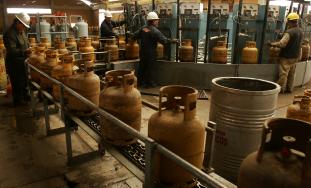Bolivia's natural gas in demand
Supply a problem as energy-starved Argentina and Brazil seek more
March 11, 2008 - Associated Press
By DAN KEANE, Associated Press
LA PAZ, BOLIVIA -- Facing blackouts and a looming South American winter, energy-gobbling Brazil and Argentina have an urgent message for their longtime natural gas supplier Bolivia: Step up production, and quick.
 (right) Employees of YPFB, Bolivia's state energy company, fill tanks of liquefied natural gas at a plant in El Alto. Brazil and Argentina have asked their longtime supplier to step up production. (from: JUAN KARITA: ASSOCIATED PRESS)
(right) Employees of YPFB, Bolivia's state energy company, fill tanks of liquefied natural gas at a plant in El Alto. Brazil and Argentina have asked their longtime supplier to step up production. (from: JUAN KARITA: ASSOCIATED PRESS)
The two countries depend on their poorer neighbor for gas to power homes, businesses and cars. But Bolivia's gas industry, stagnating after a decade of falling foreign investment, can no longer keep up with demand from the continent's two largest economies.
Last year a frigid winter burned up Argentina's tight gas supply, causing a shortfall that idled factories and gas-powered taxis. And as the Southern Hemisphere heads for winter again, experts predict the situation could be worse.
Home to South America's second-largest natural gas reserves, Bolivia produces some 1.4 billion cubic feet of it a day -- enough to feed domestic demand and a long-standing contract with Brazil, but not an ambitious 2006 export deal with Argentina.
Bolivia had gambled that the tight energy market would draw foreign investment needed to fulfill the new contract. But international companies have been wary of the nation's gas fields after President Evo Morales placed them under state control in 2006. Pledged support from Venezuela and Iran also has yet to materialize.
As investment finally begins to pick up, Bolivia expects to boost production by 5 percent this year, and another 11 percent in 2009, Vice President Alvaro Garcia said in February.
Needing more for winter
Meanwhile, energy-starved Brazil and Argentina are scrambling over the short supply.
At an energy summit last month, Argentina sought to increase its Bolivian gas imports by a third to roughly 140 million cubic feet a day for the coming winter. Morales asked Brazil, whose older gas contracts take precedence, to share with its southern neighbor.
But Brazil, which buys 1.1 billion cubic feet a day from Bolivia -- half the natural gas consumed by its 190 million residents -- could not spare "a single molecule," said Sergio Gabrielli, head of state energy company Petroleo Brasileiro.
Instead, officials spoke of long-term solutions, including new hydroelectric dams and a pledge by Brazil and Argentina to form a joint company to enrich uranium for nuclear reactors that could serve the entire region.
For the short term, Morales' two political allies gave him a pressing homework assignment.
"We have to produce more gas," Bolivian Hydrocarbons Minister Carlos Villegas said after the summit.
Landlocked nation
Landlocked Bolivia is cut off from most international markets.
That isolation has fostered a joint dependency with Brazil, which all but built Bolivia's hydrocarbons industry while using the cheap gas to fuel its own rapid economic growth.
But Bolivia's poor grew weary of watching their underground treasure feed a neighbor's wealth, and elected Morales in 2005 on a pledge to reclaim state control of the energy industry.
His takeover of the sector the next year at first spooked the few foreign investors who hadn't already fled the political instability that saw five Bolivian presidents in five years.
Natural gas production has since flatlined, while Bolivia's government tripled its share of revenues and pumped the funds toward popular social programs.
More foreign investment
The energy shortage has helped persuade private companies to open their wallets -- at least for now. Foreign investment more than quadrupled from less than $200 million in 2006 to $876 million promised so far for this year, though most is dedicated to pumping existing fields rather than developing new ones.
Bolivia's 2006 deal with Argentina would quadruple its export commitment to 978 million cubic feet a day by 2010, shipping the gas through a new $1.5 billion pipeline. But the hike in deliveries will now be pushed back until "2011, maybe 2012, or the middle of 2013," Garcia said last month. The pipeline's construction is on hold.
The delays lead some analysts to question Bolivia's grasp of the industry's calculated risks and long lead times.
Seeking alternatives
Bolivia will have to hustle if it wants to keep its customers, who are already seeking alternative supplies.
Brazilian President Luiz Inacio Lula da Silva, who was elected in 2002 following unpopular energy rationing by his predecessor, is determined to avoid the political consequences of a power shortage and has been feverishly developing other energy sources. Brazil recently discovered vast new oil and gas deposits off its Atlantic coast, even if production is still years away.
Argentina, meanwhile, pulled out of its 2001 economic crisis thanks to heavily subsidized energy prices that fed growth but crippled foreign investment in the country's own gas fields. Newly elected President Cristina Fernandez has a difficult choice: wait for an unreliable stream of Bolivian gas or raise rates to draw competition -- an unpopular move that could feed already high inflation.
"At some point Argentina may decide they're better off allowing domestic prices to increase rather pay more for Bolivian gas," said Daniel Kerner of the Eurasia Group consulting firm. "The window may be closing."